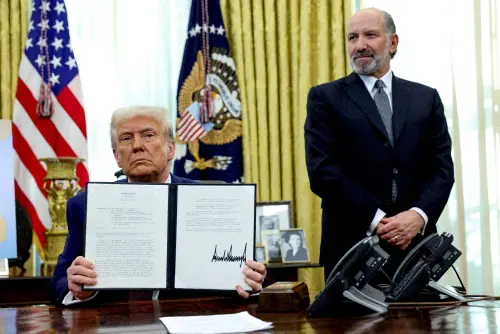Three Democratic senators have urged the President to significantly revise the United States' trade relationship with China and reconsider 14 free trade agreements to help revamp U.S. trade policy.
In a letter to the President, Senators Tammy Baldwin of Wisconsin, Gary Peters, and Elissa Slotkin of Michigan expressed their support for the comprehensive review of trade policy he has initiated and his efforts to rebuild the U.S. manufacturing sector.
The current administration has shifted U.S. trade policy and affected financial markets with measures targeting competitors like China, as well as Canada, Mexico, and specific industries, including automotive and metals. Further tariffs on countries with substantial trade surpluses are expected to be announced soon.
These policies have elicited mixed responses, drawing criticism from free trade advocates and some businesses, yet receiving backing from labor unions and certain Democratic lawmakers. This reflects a broader bipartisan concern over the loss of 4.3 million manufacturing jobs since 2001.
The senators indicated an urgent need for change, labeling previous trade decisions by both parties regarding China and other nations as flawed. They emphasized the importance of considering workers' needs in future trade policies.
They noted that free trade and globalization have led to offshored manufacturing, struggling communities, and workers facing job losses or stagnated wages, alongside supply chains that overly depend on adversarial nations. Their states have experienced these issues more acutely.
The senators called for a focus on a "pro-American worker trade policy," advocating for a reconsideration of the 2000 decision to grant China permanent normal trade relations, which facilitated its entry into the World Trade Organization.
They also suggested a reevaluation of the 14 free trade agreements with 20 countries, including the U.S.-Mexico-Canada Agreement, and emphasized the need to strengthen trade enforcement mechanisms. This includes reassessing a trade rule allowing goods valued under $800 to enter the country duty-free and with minimal inspection, a policy responsible for nearly 1.4 billion packages entering the U.S. last year.
While acknowledging the value of tariffs as a tool for leveling the playing field, the senators warned that it could take years for such measures to affect supply chains.
To ensure the effectiveness of tariffs, they called for necessary investments, the enactment of Buy America requirements, and tax incentives similar to those in the Inflation Reduction Act, which the President has pledged to repeal.
Finally, they stressed the need for equitable tax rates, robust antitrust laws, and measures to empower workers to form unions.
